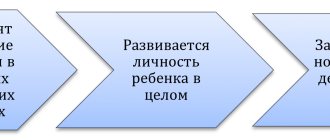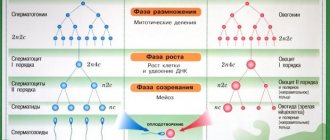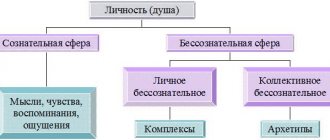Self-awareness - what is it?
Personal self-awareness is closely related to deep knowledge of oneself and understanding of the processes that occur in the mental sphere and in the body. The concept of self-awareness also includes awareness - the ability to understand the causes and consequences of occurring events.
Self-awareness is a multi-component concept. It includes:
- self-esteem;
- understanding one's own value;
- self-esteem;
- the ability to help oneself;
- tendency to introspection;
- self-realization.
Self-awareness is based on a deep understanding of oneself, acceptance of one’s strengths and weaknesses, and awareness of one’s own uniqueness. The presence of all these characteristics allows a person to develop personally, set goals and achieve his plans.
Personal self-awareness in different human sciences is interpreted very similarly. Social science explains self-awareness as a person's deep understanding of his own motives, thoughts, actions, as well as his place in society. This interpretation places emphasis on the ability to independently make decisions and be responsible for their consequences.
A philosophical view of self-awareness reveals it as an individual’s understanding of his knowledge, moral principles and motives for each action performed. In this interpretation, self-awareness is a property inherent in a deeply feeling and critically thinking person.
The structure of self-awareness
Personal self-awareness includes several components:
- understanding oneself (cognitive component) - deep knowledge about oneself, building a self-concept. It includes the idea of oneself as real, ideal, fantastic, as others see;
- attitude towards oneself at the emotional level - the ability to accept oneself with all the shortcomings and advantages, self-confidence or lack thereof. Self-esteem is formed from the first years of life under the influence of the attitude of parents and other significant adults towards the child; later it strengthens or, conversely, weakens when comparing oneself and others;
- the ability for self-regulation (behavioral component) - manifests itself through the desire for acceptance in society, to meet the requirements set by it, the desire to achieve respect;
- self-actualization - the desire to maximize one’s abilities. It manifests itself in the ability not to put off what is planned for later, in doing things that bring pleasure, constant development, the ability to accept innovations and adapt to them, awareness in relation to life, self-confidence;
- the degree of aspiration - in the desire to achieve more, the ability to set goals that are outside the zone of existing competencies.
In some sources, the components of self-awareness look like this (see table):
| intellectual | includes the ability to self-observe, stable self-esteem |
| self-regulation | is formed under the influence of self-esteem. The more stable it is, the greater the ability to self-control. |
| self improvement | deep understanding and acceptance of “I” images |
Personal self-awareness is not a static formation, but a process that requires constant development and improvement. If at any stage of life a person stops developing, his level of awareness decreases.
Functions of self-awareness
Personal self-awareness performs several functions, the main one of which is self-regulation. A person who knows himself well, his capabilities and potential, understands his needs. Such knowledge gives him the opportunity to act consciously in any situation and work on creating his desired image.
An incorrect understanding of one’s needs and inadequate assessment of resources leads to the fact that, with great effort, a person does not achieve the desired result. He either wastes his energy or works hard but does not achieve success. In both cases, disappointment, burnout, and decreased self-esteem arise. Self-regulation allows you to avoid meaningless actions.
Another function of self-awareness is identity formation. Each person is unique, there is no other person exactly the same. Only he knows exactly what efforts he had to make to achieve something, what his strength and weakness are, what is acceptable for him and what is unacceptable under any circumstances.
Every person has the right to perceive life in their own way. He has the right to his own opinion, to make independent decisions and be responsible for them. Very often, such understanding does not come immediately, and many have to fight for their own individuality all their lives.
And another function of self-awareness is to clearly understand one’s own personal boundaries and protect them. A person who is aware of his own boundaries is able to respect the boundaries of other people. He does not allow anything to happen to him that brings him discomfort and does not give up his individuality. On the one hand, this can cause misunderstanding and rejection of others. On the other hand, someone who knows how to defend their boundaries builds their defense in such a way as to experience peace and self-confidence. He is not afraid to cut ties with those who do not respect his boundaries.
XX-XX1
A person’s self-identification includes all the previous stages as components. Now, in order to become ideal, the “I”-man must establish himself as “I-clan”, “I-function” and “I-state”, and “I-religion”; the more prevailing definitions, the more complete this “I” will be " In general, this time is a dead end in some respects. Total worship of iron led to two global wars; the proclaimed freedom created a bunch of unsolvable problems, the number of which is constantly increasing. The instinct of self-preservation, reaching chimeric forms, pushes all the time to the brewing of conflicts, to a constant search for enemies, and aggression that does not find a way out clogs the consciousness with one-sided assessments. For thousands of years, humanity has been waiting for the end of the world, prototypes of Armageddon are fixed in the minds of generations, everyone harbors a piece of the Last Judgment within themselves. And don’t be surprised, the third world war has already begun, it began unnoticed, in offices and in the media. But this war is already underway, and this war is not standard, not the kind to which we are already accustomed and trained, we reassure ourselves that there will be no repetition of mistakes. The war on terrorism, with the nightmare of an expected disaster hidden in the subconscious, for which you are always preparing and are never ready.
Date of creation: 2001-2002.
Last revision date 08/12/03.
Forms of self-awareness
There are 4 types of self-awareness . They manifest themselves in different ways.
- Self-knowledge is the ability to identify oneself, understand one’s own physical and psychological characteristics, and realize one’s potential. Self-knowledge is realized through:
- self-observation - tracking the process of activity and communicating with other people, understanding the results and their compliance with the norms accepted in society;
- awareness of what personality assessments others give, what their attitude is;
- analysis of one’s own emotions, feelings, needs, the ability to transform them.
Self-knowledge becomes the basis for the formation of ideas about one’s own personality.
- Self-control is the ability to regulate one’s own emotional state and actions if they do not coincide with internal attitudes, do not produce the desired result, or conflict with the demands of the outside world.
- Self-esteem is the level of a person’s acceptance of his qualities, personal characteristics, love and respect for himself. A confident person has stable, adequate self-esteem. He is able to make informed decisions and bear responsibility for them. Low self-esteem manifests itself depending on the opinions of others, it is accompanied by a pronounced feeling of guilt and other problems. A person with high self-esteem demonstrates arrogance and arrogance.
- Acceptance of yourself and your uniqueness, refusal of constant criticism of your own actions, self-deprecation. Self-acceptance also includes self-respect; it is formed when a person sets goals for himself and achieves them.
A person is sufficiently mature if all 4 types of self-awareness are sufficiently developed.
Features of the formation of self-awareness
The emergence of self-awareness begins from the first days of life and later it deepens and improves as a person accumulates knowledge about himself. Conventionally, the process of forming self-awareness is divided into several stages:
- from birth to 1 year - the child receives the first knowledge about himself. They consist in awareness of the physiological needs for food and care. The baby also perceives the attitude of the mother or other significant adult towards him;
- 2-3 years - the child begins to perceive himself as a separate person, shows independence within the limits of his age;
- 4-7 years - knowledge about one’s own body and emotions becomes more complex, the child can recognize and understand the origins of his emotions and physical reactions;
- 8-18 years old - knowledge about oneself becomes more complex and transformed under the influence of one’s own achievements, as well as by comparing oneself with peers, a person acquires stable knowledge about one’s own personality.
Throughout life, knowledge about oneself can change. Self-awareness is influenced by the ratio of ideas about oneself, ideal and real, evaluation by others, the level of aspirations and achievements, and social status.
Bibliography
- Ageev V.S. Psychology of intergroup relations. - Moscow: Moscow State University Publishing House, 1983. - 144 p.
- Alekseev V.A. Development of self-awareness at the turn of adolescence and youth: Dis. Ph.D. - M., 1985. - 20 p.
- Bozhovich L.I., Slavina L.S. Psychological development of a schoolchild and his upbringing. - Moscow: Knowledge, 1979. - 96 p.
- Age and individual characteristics of younger adolescents / Ed. D.B. Elkonina and T.V. Dragunova. - Moscow: Education, 1967. - 360 p.
- In the world of a teenager / Edited by A.A. Bodaleva. - Moscow: Medicine, 1981. 293 p.
- Vygotsky L.S. Collected Works, in six volumes, ed. A.V. Zaporozhets. T. 4. Child psychology / Ed. D.B. Elkonina. - M.: Pedagogy, 1984. - 433 p.
- Dragunova T.V. Psychological characteristics. - Sov. pedagogy, 1972, N 8, p. 79-93.
- Dusavitsky A.K. Personality development in educational activities. - Moscow: House of Pedagogy, 1996. - 208 p.
- Kon I.S. Discovery of “Ya.” - M.: Politizdat, 1978 -367 p.
- Kon I.S. In search of oneself.-M.: Politizdat, 1984. -335 p.
- Krutetsky V.A., Lukin N.S. Psychology of a teenager. - Moscow: Education, 1965. - 316 p.
- Kulagina I.Yu. Developmental psychology (Child development from birth to 17 years): Textbook. -M.: ROSU Publishing House, 1996. - 180 p.
- Leontyev A.N. Problems of mental development. — Fourth ed. - Moscow: Moscow University Publishing House, 1981. - 584 p.
- Lozotseva V.N. Peculiarities of a teenager’s attitude towards a peer as a model: Abstract. dis. ….cand. psychol. Sci. M., 1978. - 20 p.
- Malakhova A.I. Consciousness and self-awareness of the individual. — Dissertation for the degree of candidate of philosophical sciences. -L., 1972. - 23 p.
- Oleynik L.D. Personal self-awareness and ways of its formation. — Dissertation for the degree of candidate of philosophical sciences. - L., 1975. - 25 p.
- Psychological Dictionary.
- Remschmidt H. Adolescence and youth: Problems of personality formation. - M.: Mir, 1994 _ 320 p.
- Rogov E.I. Handbook of practical psychologist in education. - M.: VLADOS, 1995. - 529 p.
- Romanova E.S., Potemkina S.F. Graphic methods in psychological diagnostics. - Moscow: Didakt, 1992. - 256 p.
- Stolin V.V. Personal self-awareness. - Moscow: Moscow University Publishing House, 1983. - 288 p.
- For teachers and parents about the psychology of adolescence / Ed. G.G. Arakelova. — Moscow: Higher School. 1990. - 304 p.
- Feldshtein D.I. Problems of developmental and educational psychology. - Moscow: International Pedagogical Academy, 1995. - 368 p.
- Feldshtein D.I. Psychology of raising a teenager. - M.: Knowledge, 1978. - 54 p.
- Philosophical Encyclopedia.
- Textbook of developmental psychology. Textbook for students / Comp. Semenyuk L.M., ed. DI. Feldstein. - Moscow: International Pedagogical Academy, 1994. - 256 p.
- Chamata P.R. On the question of the genesis of human self-awareness. M., 1966, p. 228 - 239.
- Chesnokova I.I. The problem of self-awareness in psychology. M., 1977. - 144 p.
Stages of development of self-awareness
Self-awareness develops gradually. At the first stage, a person learns to distinguish himself from the world around him. He begins to realize himself as a separate organism, an individual. Then the ability to self-control and the ability to influence one’s actions is formed. Growing up, a person learns first to control physiological reactions, and later - consciousness.
At the final stage, self-acceptance is formed, the ability to accurately assess one’s own capabilities, positive and negative aspects of the individual.
A person goes from the stage of separation of himself from another (mother) to complete autonomy.
Psychologists offer the following periodization of the process of development of self-awareness in ontogenesis:
- 0-8 months - the child actively becomes acquainted with his own body;
- 8-12 months - the child actively studies people from his immediate environment, strangers, he has the first understanding that he is different;
- after 1 year, the baby strives for autonomy; along with independence, his responsibility increases. In activities, the child takes the position of a subject, realizing that he can manipulate objects and control their position in space;
- from 3 to 6-7 years - the child actively studies his own reactions and the reactions of other people during interaction. He forms behavioral patterns that he uses in similar situations;
- 6-7 years old - an understanding of his role in society arises, the child learns to follow accepted norms, and is guided by his own beliefs;
- 8-12 years - self-awareness is actively being formed, an understanding of one’s own capabilities arises;
- from 13 to 18 years old - a teenager seeks to deeply explore his individuality, and also compares ideas about himself with how he sees other people. Personal orientation is formed;
- from 18 to 20 years of age, the will is actively formed, the ability to self-control is improved, and a person makes plans for life. He becomes more independent and objective in his judgments, and feels the need to realize his potential.
Adulthood is a time of active implementation of plans. The personality goes through periods of crisis, during which it becomes even stronger or weakens. In old age, one evaluates what has been achieved.
Disorders of self-awareness
Incorrect resolution of personal crises leads to an inadequate perception of oneself. Experts identify several variants of anomalies that are possible during the formation of self-awareness. They manifest themselves in a person’s sense of self, and also affect his relationships with others and his perception of the world as a whole.
Disorders of self-awareness include:
- desire to avoid close interpersonal relationships;
- a feeling of anxiety and fear about the future, growing up, the passage of time;
- unproductive and chaotic actions, wasting potential and resources, inability to concentrate on a specific goal and follow a plan to achieve it;
- reluctance to make a decision and get to know yourself better, choosing destructive role models.
If a person’s self-image is formed according to an unfavorable scenario, then this has a negative impact on the individual. A person becomes unsure of himself, he is afraid of rejection, and has low self-esteem. This type of self-awareness is dangerous because a person:
- does not respect himself enough, this affects the attitude towards him in society;
- displays aggression and antisocial behavior;
- incapable of decisive action;
- in difficult situations, takes the position of an opportunist, may become a member of an asocial group or be subject to the influence of others;
- perceives appearance inadequately and cannot give an objective assessment of himself and his actions.
Failures in the development of self-awareness can also cause addictive behavior and a distorted perception of oneself. Often the problem leads to egocentrism and also becomes the basis for the formation of mental disorders.
Irina Sherbul
In psychology
In psychology, self-awareness
is understood as a mental phenomenon, a person’s consciousness of himself as a subject of activity, as a result of which a person’s ideas about himself are formed into a mental “Image-I”.
| The child does not immediately realize himself as an “I”; During the first years, he often calls himself by name - as those around him call him; he first exists for himself, rather as an object for other people, than as an independent subject in relation to them. |
Rubinshtein S. L.
Fundamentals of general psychology. - M., 1946.
Developing Self Awareness
Main article: Development of self-awareness
Self-awareness is not an initial given inherent in man, but a product of development. However, the beginnings of consciousness of identity appear already in an infant, when he begins to distinguish between sensations caused by external objects and sensations caused by his own body, the consciousness of “I” - from about three years old, when the child begins to correctly use personal pronouns. Awareness of one's mental qualities and self-esteem acquire the greatest importance in adolescence and young adulthood. But since all these components are interconnected, the enrichment of one of them inevitably modifies the entire system.
Stages
(or stages) of development of self-awareness:
- The discovery of the “I” occurs at the age of 1 year.
- By the age of two or three, a person begins to separate the results of his actions from the actions of others and clearly recognizes himself as a doer.
- By the age of seven, the ability to evaluate oneself (self-esteem) is formed.
- Adolescence and adolescence is a stage of active self-knowledge, searching for oneself and one’s own style. The period of formation of social and moral assessments is coming to an end.
The formation of self-awareness is influenced by:
- Evaluations of others and status in the peer group.
- Correlation between “Real Self” and “Ideal Self.”
- Assessing the results of your activities.
Components of Self-Awareness
Components of self-awareness according to V. S. Merlin:
- consciousness of one's identity;
- consciousness of one’s own “I” as an active, active principle;
- consciousness of one's mental properties and qualities;
- a certain system of social and moral self-esteem.
All these elements are related to each other functionally and genetically, but they are not formed at the same time.








